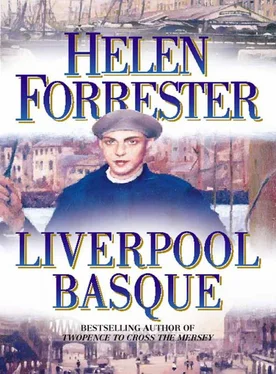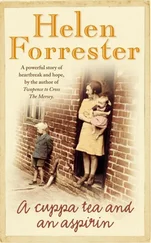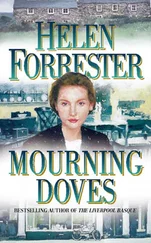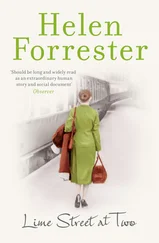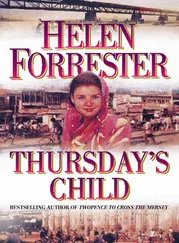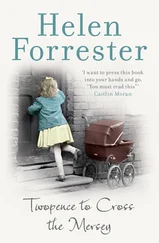‘Who you lookin’ for?’ asked a young woman, hooking a cage of kittens on to the handlebars of a bicycle, near the Elliott Street entrance.
Rosita told her.
‘Oh, aye,’ she replied readily. ‘He were nearly run over, he was. You’ll mebbe find ’im across the road. I’ll bet you’ll find ’im in the station there – kids love trains.’ She smiled, and mounted her bike and wobbled over the cobblestones in the general direction to which she had pointed.
‘Oh, goodness!’ Rosita exclaimed, her face paling, as, united, the four women pushed their way to the edge of the Elliott Street pavement. A break in the traffic revealed Manuel, with his mouth as wide as a choir boy’s singing a Te Deum, shrieking, ‘I want me mam.’
Rosita’s expression changed immediately to one of parental outrage. With baby Francesca bouncing on her chest and followed by the other three, shawls flapping like the wings of angry magpies, she surged through a break in the traffic, to face her tear-stained son. Before the child could do more than turn his face to her and reduce his sobs, she scolded him, ‘What do you mean by running off like this? We bin scared stiff for you. I’ll tell your dad about you, when he gets home!’ With her free hand, she grabbed him by the shoulder and shook him.
Far from being more upset by this, Manuel recognized the typical reaction of a mam who had indeed been scared. His sobs became sniffs, as she alternately cajoled and scolded again.
Meanwhile, Grandma Micaela, who was feeling extremely tired, looked on silently, and the news-vendor asked her, ‘Do you want the ’en, Queen?’ He pointed up to the bank windowsill, on which the hen lay inert.
Grandma blinked, and her eyes followed the line of the man’s finger. She peered at the bank wall. Halfway up, she saw a vague, copper-coloured lump. ‘On the windowsill,’ the man said impatiently.
Grandma was under five feet tall; the sill was impossibly high up for her. ‘Could you possibly reach it?’ she asked shyly.
The man grinned. ‘Anything to oblige a lady,’ he responded with sudden gallantry. He reached up and managed to gather the bird into his hand. After inspecting it dubiously, he said, ‘It looks like dead, Missus.’
‘It’s fresh enough to cook,’ she told him, with a little laugh. Her faded blue eyes, though partially clouded by cataracts, still had a twinkle in them, and the news-vendor returned to his pitch feeling pleased with himself.
Grandma laid the hen on top of the other two in her calico bag. Rosita had finished her scolding and was wiping Manuel’s face with the corner of her apron. Her friends stopped gossiping about the high price of rabbits – and the party straggled down Hanover Street towards home.
At home, the oil lamp had been lit. Grandpa was seated at the kitchen table, writing in his ledger. Behind him, on the wall, the huge map on which Pedro recorded his voyages, glimmered softly, the net of inky lines linking the ports of call looking like a tangled mass of black cotton thread.
As the shoppers entered, he closed the book wearily. He nodded to his wife and to Rosita, as they entered and thankfully plonked the shopping bags on the draining board by the kitchen sink. The baby was beginning to whimper from hunger, and Grandma said she would make a pot of tea before starting the evening meal. Rosita nodded agreement, and sat down in a rocking chair. She unbuttoned her black blouse and modestly arranged her shawl round the baby’s head and her breast, while she fed her new daughter.
Manuel slunk to the other side of the fireplace, where Aunt Maria had, in their absence, established herself in an easy chair. He leaned against his aunt, who put down the knitting she had been struggling to do and put her arm round him. He was grateful for her presence; he had missed her during her stay in hospital.
He could not have articulated his sense of desertion as he watched his mother feed the baby. He only knew he longed to be cuddled by her and to lay his head on her milky breast. Not even when she called him her big boy, and sent him off to school with a loving pat on his behind, was he comforted.
Auntie Maria suddenly began to cough. She withdrew her arm, and fumbled for her handkerchief in her dressing-gown pocket. She put it to her mouth, and tried to smile at Manuel over its folds.
As she had taught him, he stepped back from her while the spasm lasted. ‘I don’t want to splutter all over you,’ she had once explained to him. ‘It’s not very nice.’
Aunt Maria’s cough was part and parcel of Manuel’s childhood; he slept in the same room as she did, and the sound of it comforted him when he woke in the night after a bad dream; it meant that she was awake, and if he were very scared, he could scramble out of bed and run to her. It puzzled him, however, that, unlike his mother, she would never let him into her bed, however much he was shivering with fright; and she was the only one of his doting relations who did not kiss him; even Grandpa kissed him sometimes. He occasionally thought that he would never understand the idiosyncrasies of grown-ups.
After feeding Francesca, Rosita laid the dozing child in Manuel’s old cradle, near the fireplace, but far enough from it not to be spattered by the fat in which Grandma was frying fish for tea. She then unpacked the three hens and took them out into the brick-lined backyard, to feather and singe them. Though the stallholder had obligingly wrung the necks of the two hens, he had complained sourly that he would not have lost the third one if Grandma had not insisted on the cage being opened. He could not run after the flying bird himself, he said bitterly, because it would have meant leaving his stall untended in an area where petty theft was a fine art.
After the meal, the hens were brought in and drawn on the draining board, giving Manuel an early lesson in anatomy, as he watched the operation.
The naked birds were then washed and hung up in the larder overnight. Manuel stared up at them, and decided they did not look much different from Francesca, after she had been bathed in front of the kitchen fire.
That night he dreamed that he had been hung up in the larder, by his feet. He was too terrified even to run across to Auntie Maria’s bed, and he lay quivering under his cotton sheet until sleep overtook him again.
In the golden summer days of 1914 his view of his world was that of a child, considered Manuel. His was a permanent world which Grandpa Barinèta would rule for ever. Ample food arrived on the table at least three times a day, and boys did their best not to offend Grandma Micaela or Mother, who ruled the kitchen-living-room like royal queens.
Close by his home was the world of school, where nuns in white wimples and long black dresses talked of eternity and the need to be a good Catholic boy; so that when one died – an event which would take place so far ahead that one could not envision it – one could, in a state of grace, enjoy eternity sitting on the right hand of God, where, hoped Little Manuel fervently, there would be no nuns with sharp voices and spanking rulers to tell you that you had been naughty again. He had secretly wondered if God liked nuns. Old Manuel reflected that the latter thought had seemed so wicked that he had hastily stifled it and had hoped that St Peter would not make a note of it.
At the edge of his world, not counting St John’s Market, lay St Peter’s Church in Seel Street, where, every Sunday morning, he went to Mass with either Grandma or his mother. Though the conversation of the congregation was split between Spanish, Basque and English, the Mass was said in Latin; his father said that it did not matter which port he was in, the Mass was always there, always the same – in Latin. Little Manuel began to think that there was something magical about Latin.
Читать дальше
